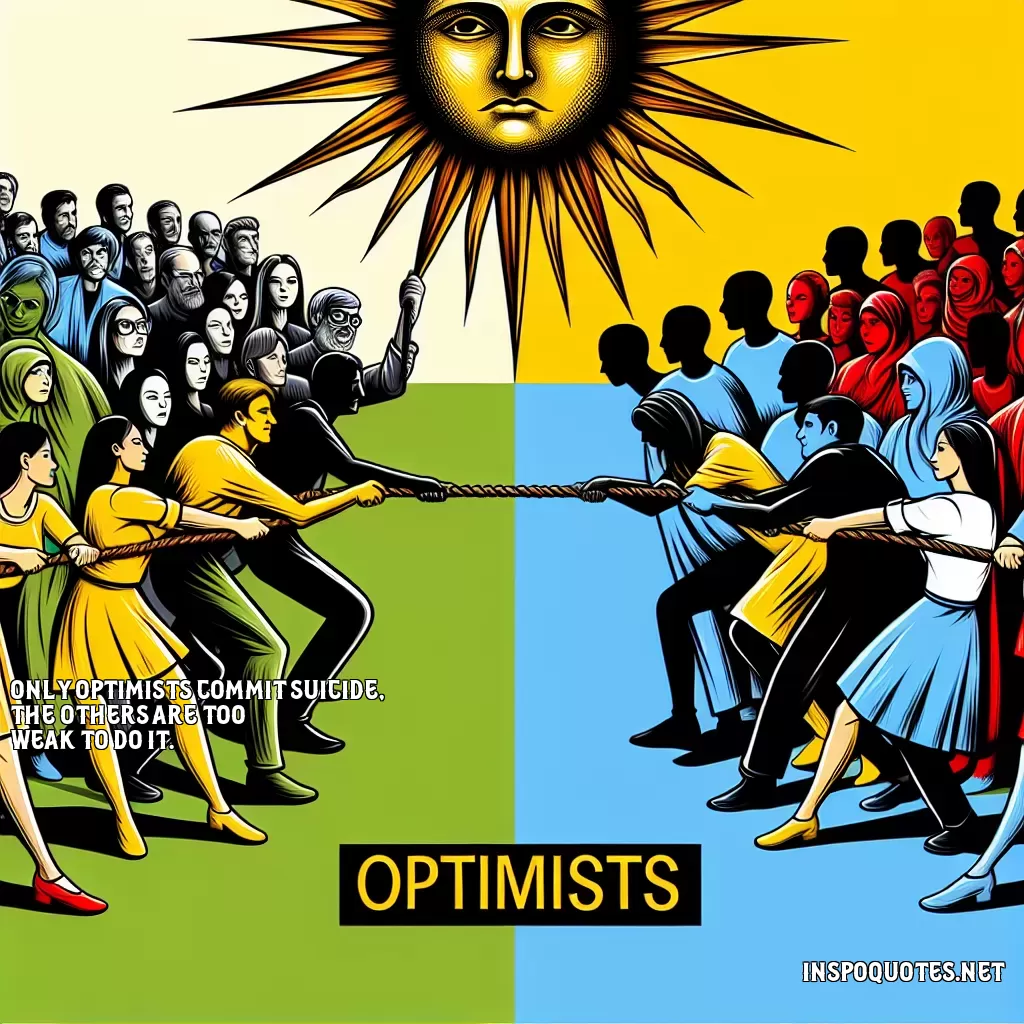
Only optimists commit suicide, the others are too weak to do it.
Author: Emil Cioran
👁️ 20 views
This provocative quote, "Only optimists commit suicide, the others are too weak to do it," is attributed to the Polish writer and philosopher Emil Cioran, who often delved into existential and pessimistic themes. On the surface, this statement seems paradoxical, as optimism is generally associated with positive outlooks, while suicide is often linked to despair and hopelessness. However, the quote invites a deeper exploration into the complexities of human psychology and the nature of despair. The assertion that "only optimists commit suicide" can be interpreted to mean that individuals who have experienced optimism or hope in their lives may face profound despair when those hopes are dashed. Such individuals may have had a vision of a better future or a belief in the potential for happiness but can feel a profound sense of loss and disillusionment when reality fails to meet their expectations. This dissonance between their optimistic hopes and their harsh reality could drive them to take drastic actions. Conversely, the claim that "the others are too weak to do it" suggests that those who have never experienced significant optimism or who exist in a perpetual state of resignation may lack the emotional energy or decisiveness to end their own lives. For them, their existence, although unhappy, is a known constant that they may feel incapable of altering through such a definitive act as suicide. This interpretation implies that an individual's capacity for radical change, including the finality of suicide, might be rooted in a previously held belief in the possibility of change, which, when extinguished, can lead to the ultimate despair. Overall, this quote encourages contemplation on the relationship between hope, despair, and human action, revealing the intricate and often paradoxical connections between a person's mental state and their decisions.
Quote By: Emil Cioran
Emil Cioran was a Romanian philosopher and essayist, born on April 8, 1911, in Rășinari, a small village in Transylvania. His early life was steeped in a culture rich in folklore and the Orthodox Christian tradition, which would later influence his existential musings. Cioran was educated in the city of Sibiu, where he studied philosophy and literature. He later moved to Bucharest, immersing himself in the vibrant intellectual milieu of the time, where he became associated with the Romanian avant-garde.
After the tumultuous years of World War II and with the rise of Communism in Romania, Cioran eventually decided to leave his homeland in 1941. He settled in Paris, where he would spend the rest of his life. This move marked a significant turning point in Cioran's life and work; he became increasingly disenchanted with the world, a theme prevalent in his writings. In Paris, Cioran's unique voice emerged, characterized by a profound sense of pessimism and a sardonic wit. He wrote primarily in French, transcending linguistic barriers and earning recognition in literary circles across Europe.
Emil Cioran's philosophical writings explored themes of despair, nihilism, and the absurdity of existence. His most notable works include "On the Heights of Despair" (1934), "The Trouble with Being Born" (1973), and "A Short History of Decay" (1949). In these texts, Cioran grapples with the struggles of human existence and the futility of life, reflecting his belief that suffering is an inherent part of the human condition. His aphoristic style and incisive observations have continued to resonate with readers, earning him a place among the great existential thinkers of the 20th century.
Cioran's literary contributions are marked not only by their philosophical depth but also by their striking lyrical quality. His works challenge the reader to confront uncomfortable truths about life, death, and the often absurd nature of existence. Emil Cioran passed away on July 20, 1995, in Paris, leaving behind a rich legacy that continues to inspire philosophical inquiry and literary exploration. His insights remain relevant today, as they articulate the complexities of human emotional experience with a clarity and poignancy that few have matched.